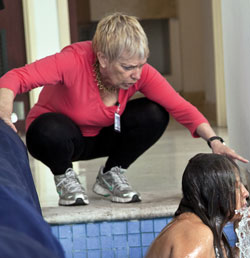Wider World
Feature
Total Immersion

“I’ve got a situation here,” said Rabbi Jacques Cukierkorn as he stood at the edge of the freshwater pool. “I can do the men’s mikve but we’ve got a woman with two daughters who will be taking off their bathing suits in the water. It can’t be me who performs the mikve ritual with them.
“So,” he added, “I guess you’re the mikve lady.”
He told me that they should submerge their entire bodies, the prayer they should recite and then withdrew.
I recalled the one time I had been in a mikve and asked Veronica Padilla and her children, Jereh, 8, and Sara, 6, to immerse themselves three times and repeat the prayer after me. I expected to stumble over at least one word of the Hebrew prayer, which I did.
I did not expect my eyes to fill with tears from the intensity of the devotion and earnestness of the converts. Clearly, this was an immersion into the deep waters of Judaism, a spiritual cleansing to enter the Jewish world. I was so touched by the difficulties the would-be converts had been through that I cried into the pool. When they emerged from the water, they wrapped themselves in towels and were one step further along in the conversion process. I am not sure if it was kosher, but I hugged them and shouted, “Mazel tov!”
“So you know that a beit din doesn’t require three rabbis,” Cukierkorn told me afterward.
I nodded absently.
“In fact, according to the Talmud, the only requirement is that there be three knowledgeable Jews.”
I nodded again.
“So I am asking you to be part of the beit din for all the converts today,” the rabbi informed me.
“You know I’m not at all observant,” I replied.
“You study all the time,” he responded. “You lead your own iconoclastic Jewish community and you are a knowledgeable and heartfelt Jew. We are meeting this afternoon. O.K.?”
A few hours later, three of us sat in a private area of the Fiesta Inn in Cuatitlan, a suburb of Mexico City; the rabbi lavished gifts on the slightly nervous near-Jews going before the beit din. First came Seder plates, then small Israeli flags, then menoras. Then things got serious.
The first to be judged by the tribunal was Francisco Brambila, a fiftysomething Mexican professor of linguistics from Atlautla. “My father and I are Masons,” he said. “The York rites are very close to the system of values of Judaism. It’s like ethical monotheism. But now we are builders of our inner temple.”
“I have a question for you,” I piped up. “Who is the mother of Judaism?”
After he said Sarah, I followed up with, “What was the sin of King David?” “Adultery with Batsheva.” And, on the subject of sins, I inquired if he knew what lashon hara was and why it was second only to murder in terms of sins. “Evil tongue,” he replied. “When you talk behind someone’s back, you kill their spirit.”
The rabbi leaned over and whispered to me, “I hope you’ll continue posing questions like that on batei din in the future.”
The future? What are the odds I would ever again sit on a beit din?
I started asking Brambila personal questions about his former religion and beliefs and how Judaism differed from that faith. I inquired about his favorite Jewish holiday. Cukierkorn asked if he had a dream the night before that he remembered. Then, Brambila was asked to withdraw while we deliberated.
The rabbi smiled. “We are here to say yes, not no,” he explained. “The unspoken question is: Are you worthy of being accepted by us, and are we worthy of being accepted by you?”
Of course Brambila was accepted, as were Padilla, her daughters, Charton Baggio and Rodolfo Castaneda, 64, a college professor from Hermosillo, Sonora. They were relieved and excited. Each one said he or she already felt Jewish in his or her heart.
There was one more step: the conversion ceremony. The next day, the rabbi asked each of them if they agreed to accept Judaism to the exclusion of all other religions; to participate in the Jewish life of the synagogue; and to raise their children as Jews. All agreed. They listened in Spanish to the words of the famous matriarchal convert, Ruth: “Whither thou goest, I will go…and where you lodge, I will lodge. Your people shall be my people, and your God, my God.”
Each, in turn, was handed a Torah to hold as they recited the Shema. The rabbi enfolded each in his talit and blessed them. Finally, they were given certificates of conversion and welcomed into Judaism.
I have been writing about the descendents of crypto-Jews for 17 years, but had never before been part of the conversion process of both crypto-Jews and non-Jews, most of whom knew little or nothing about their ancestors but were drawn to Judaism.
On that day, six new Jews entered our community. We are fortunate to have them.










 Facebook
Facebook Instagram
Instagram Twitter
Twitter
Leave a Reply